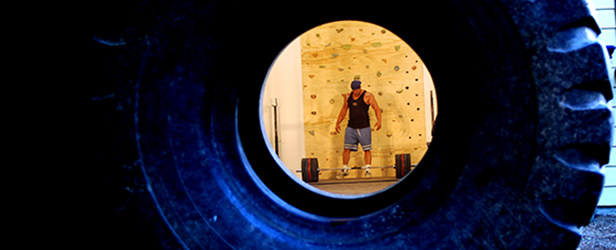
My experience in strongman has given me the opportunity to see many new competitors enter the sport. There are specific challenges all new competitors face, no matter how they enter the sport or what their athletic history is. However, there are two groups that many new strongmen fall into. The members of these two groups, which I like to call The Novice Strongmen and The Local Enthusiasts, require different training protocols to make the most of their strongmen debuts.
The Novice Strongmen
Since I joined in the close knit strongman community, my favorite thing has been to have new guys join the crew and watch them compete in contests. The novice strongman competitor embodies everything it is to be a strongman. They are usually the most excited to be at the contest, they are usually incredibly nervous, and without fail they are the competitor that every athlete in attendance will cheer on through a brutal yoke walk or an excruciatingly long husafell stone carry.
The novice strongman competitor is a distinct subsection of the entire strongman community. They are not classified necessarily by the class in which they compete, but rather by a list of certain physiological and psychological attributes. First, they are incredibly excited to compete at a contest, they love strongman, and they love telling their family and coworkers and anybody else that will listen all about their weekend adventures of flipping tires and bathing in baby oil to get off that sticky stuff from the stones.
However, they usually have very difficult time settling into their emotions. This generally plays against them in regards to their performance. They either get so hyped up or excited for an event that they cannot control it and it causes them to make silly mistakes, or they are so nervous that when the event begins they can hardly feel their legs and they are unable to do the same weight they did in training. The mental aspect of being a novice often plays against them, and the slightest change in an event, whether it be distance or weight or even taking the turn out of farmers walk suddenly, gives them the anxiety of a mom at her son’s first soccer game.
Now, the physiological attributes of a novice strongman can be divided up usually into different paths. The first path is the conversion. Often guys convert from one strength sport to the next, and that is no exception to strongman. The most common converts come over from powerlifting with some bodybuilders, crossfitters, and Olympic lifters sprinkled in there. These guys tend to be very statically strong and are often at the top of the class with the static events like pressing and deadlifting. They tend to struggle, though, with the awkwardness of the implements. The cumbersomeness of the log, the shaky yoke, or just moving with heavy weight often gives them a lot of trouble.
Setting up a program for this group is often fairly easy. These guys are accustomed to following a strict protocol and do so without much trouble. The first thing that would help them is to touch the implements as often as possible. The amount of days that they would train will obviously vary from individual to individual based on their recovery abilities, but I would advocate lots of reps in overhead pressing. Most of these athletes, with the exception of Olympic lifters, are not used to standing up while pressing a weight overhead and they need reps to adapt to that new plane. Using a very straightforward linear model with them usually does the trick.
Then comes the squatting, which I will describe related to the deadlift. I would not advocate heavy squatting and deadlifting in the same week for this type of novice; he has so much adaptation from the events he’s doing that you want him to recover from that first and foremost. The squats and deadlifts should be treated as assistance work to those events since these guys all squat and deadlift already. For squatting, I would highly recommend they do away with back squatting for the most part. It takes a pretty big toll on you and I don’t find much carryover from back squatting. Instead, they should implement lots and lots of front squats. Alternate the efforts week to week between high rep front squats and heavy, low rep front squats. Then deadlifts should alternate opposite of that when the front squats are heavy. Do speed work with deadlifts, and when the front squats are light, get in your heavy pulling. Include any deadlift variations in event training, since that will be sport specific training.
Now, onto events. Events should be done weekly; they will get good at them rapidly since there is so much room for improvement. Guys coming from other disciplines will have minimal experience moving with weight. All of the disciplines I listed involve moving weight within one plane. So, the multi-planar movements are something they need to be familiarized with. This needs to be done in a logical manner.
If you have them touching something near max capacity every week, they will burn out quickly. I advocate using time and distance as primary stimuli and making weight one of the less-often used stimuli. Increase weight seldom unless they have mastered the movement. I assure you, there will never be a heavy yoke for 10 feet in a contest, so getting good at carrying a yoke 10 feet doesn’t do any beginner any good. I also strongly recommend you time everything. Even if nobody gives you the time until you finish, it’s very difficult to guess how long 60 seconds is. It can be over really fast or be an eternity depending on the event. Either way, I highly recommend getting used to being on the clock. An example of a split for events would be this:
The program would go together as follows:
You will notice that there is no max effort day in this routine. There is heavy work, but no maxing out. Powerlifters and Olympic lifters are very good at one rep maxes and therefore they should not practice something they are really good at, but rather practice the things they are not. I know this from experience. I used to win every overhead event and then get my butt handed to me because I trained events like an idiot. When I smartened up and got really fast and stopped making mistakes, I started placing much better.
The Local Enthusiasts
The other subdivision you have is the local enthusiast. This is often the new guy to join the group or a buddy of a current group member that has been to contests and now wants a taste of the action. This guy is often at a disadvantage in terms of base strength level but is randomly a star at certain events. I once witnessed a guy that could not squat 315 to depth doing wind sprints with 650 his first time touching it, and another guy that could not deadlift 500 loading a 360 stone his first time. These guys will benefit from building a base foundation and learning to coordinate themselves with heavy weight.
In general, they tend to be very skinny and frail or very overweight. I suggest getting in better shape whether that means get jacked and put on a lot of muscle or get on a nutrition plan with a properly educated strength based nutrition coach to help you lean out while getting stronger. Do not go hire the local Registered Dietician that deals with fitness models and WIC moms. Hire the guy with the performance background or you will be severely discouraged when you have no juice left in the tank and are getting weaker your first month of dieting. Similarly, these guys need to get in lots of event reps but the different thing is they’re not super strong so the weights they will be using are far less taxing and therefore they can recover more easily from their workouts. The training protocol would be fairly straightforward and linear in fashion.
And for all of those included in this, one of the most important things that I seldom see recommended is find a great group of knowledgeable guys. I often see a group of what I kindly refer to as the blind leading the blind at a contest. This is when the guy offering the advice should be the one taking it from somebody else. I often warn my competitors of the mistakes I see frequently at shows and tell them how to avoid them. Without fail they come up to me after a contest telling me “Hey all that stuff you told us not to do, we saw a bunch of the other competitors doing.”
It goes without saying, but choose a group of guys that you generally like being around. You will see them a lot, and the more you like being around them the more likely you are to stick it out. This sport is all about time accumulation; the longer you are in it, the more time you put into it, and the more you compete, the better you will get.









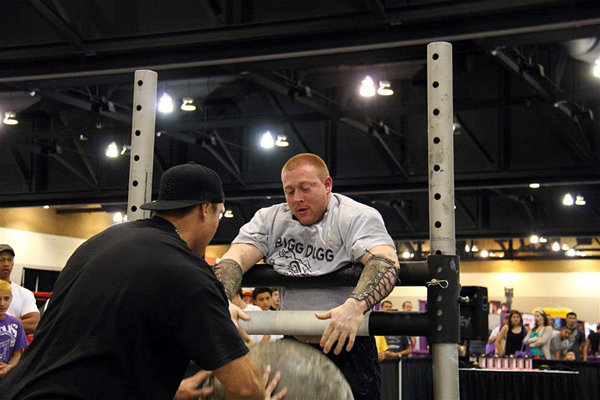
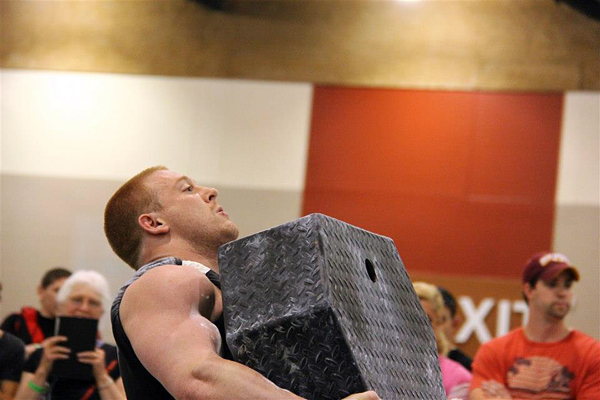
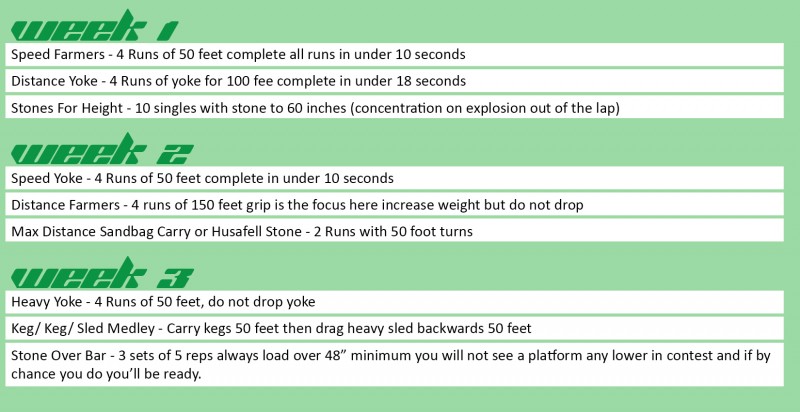
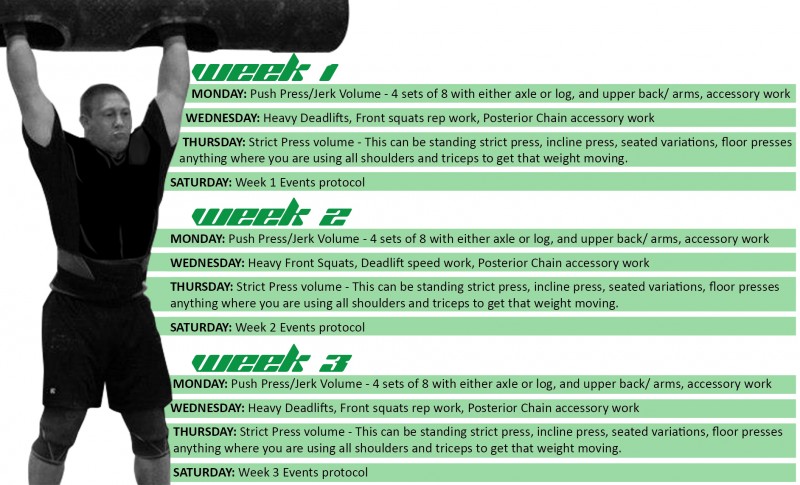
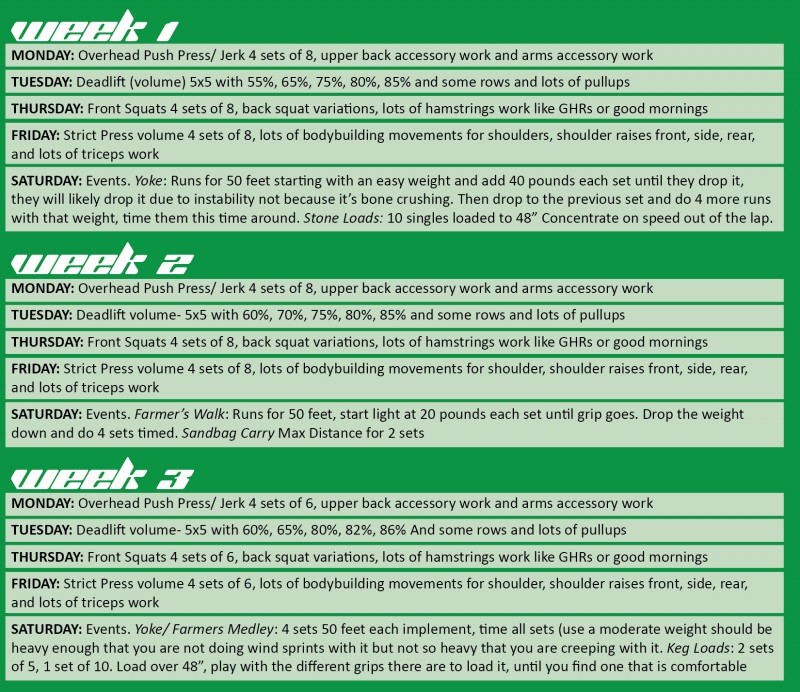
1 Comment